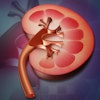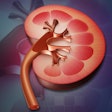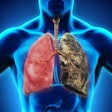CHICAGO - Maybe you've heard about a die-hard smoker who takes one look at his chest x-ray and gives up the habit for good. The tale may be more than anecdotal, according to researchers at Weill Medical College of Cornell University in New York City.
The researchers found that undergoing CT lung cancer screening and discussing the results with a radiologist was a significant factor in motivating long-term smokers to quit -- and the experience may motivate men more strongly than women.
Dr. Nathasha Buckshee of Cornell presented the study Monday as part of the RSNA conference's health services policy and research scientific sessions. The 307 participants were all long-term smokers or former smokers over 60 who participated in a program called the Early Lung Cancer Detection Program, or ENDCAP.
The study required participants to undergo a baseline CT screening and consultation, followed by a detailed telephone survey and a one-year follow-up screening. The actions and motivations of the enrollees were gleaned from a patient satisfaction survey conducted immediately after the second consultation with the radiologist.
Out of 137 participants who were still smoking when they enrolled in the program, half (69) said they had quit or decreased their smoking after the initial screening and consultation, including 55% of the men and 46% of the women.
Similarly, while 76% of the participants said the experience made them think about quitting, the figure included more men (84%) than women (71%). Nearly twice as many women (15%) were concerned about the cost and potential dangers of the annual screening as men (9%). Nearly all of the participants (98%) were satisfied with the program.
When asked whether the participants were representative of those screened in other studies, Dr. Buckshee said that although she considered the study population to be representative, the study was only preliminary, undertaken to determine if the screening and consultation process had any effect on smoking. She said the questionnaire was being rewritten for use in a larger follow-up study that would profile participants by categories such as age.
Dr. Buckshee said she believed the change in smoking behavior following screening and interaction with a radiologist "could be optimized by pairing them with smoking cessation and counseling programs."
By Eric BarnesAuntMinnie.com staff writer
December 1, 1999
















